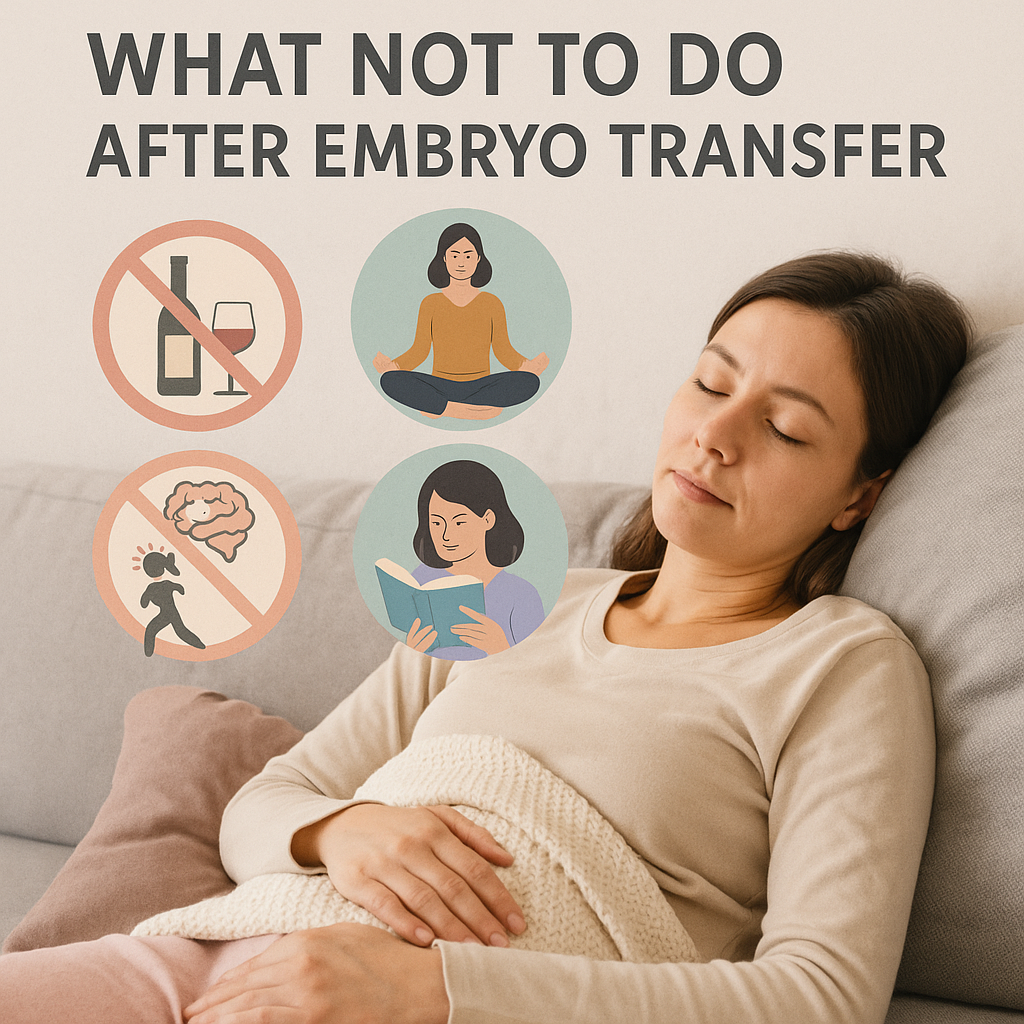Do’s and Don’ts: What Not to Do After Embryo Transfer

The IVF process comes with many highs and lows. Embryo transfer is one of the more exciting events in this emotional and rewarding journey. However, it also includes waiting and wondering whether the transfer will be successful.
While there’s no way to guarantee pregnancy after embryo transfer, there may be a few things you can do to support the process and your body’s response. Keep reading to uncover what activities to embrace and what not to do after embryo transfer.
Do: Get Some R and R
After embryo transfer, the most beneficial thing you can do is let your body rest. Remember, you just underwent a potentially life-changing event that took a toll on you, both physically and emotionally. You don’t need to stay in bed all day, but you should take a day or two to recover and practice self-care.
Adopt healthy and relaxing activities like gentle walking, listening to music, meditating, deep breathing, and reading. Performing regular daily tasks won’t cause the embryos to fall out (a common fear among women), but pampering yourself will do wonders for your nervous system and help prepare you for what’s to come. If possible, take the following day off from work and spend it comfortably at home.
Don’t: Engage in Vigorous Physical Activity or Overheating
Embryo transfer doesn’t require bed rest, but it does require you to go easy for a few days. That means no strenuous activities or intense exercise. Always choose light, gentle activities and avoid vigorous workouts. Don’t lift anything over 10 pounds or engage in high-impact movements. You should also avoid any sports or activities with a risk of falling, contact, or injury.
While certain low-impact activities can help your body respond to embryo transfer, you should avoid exertion or excessive heat. Stay away from hot baths, saunas, and hot tubs. Elevated body temperature can have negative impacts on recent embryo implantation. If you want to take a soothing bath, stick with lukewarm water.
Do: Stay Hydrated and Nourished
If you already eat a healthy, well-balanced diet and get your daily recommended dose of H20, keep up the good work! Include plenty of fruits, vegetables, whole grains, and lean proteins in your meals. Basically, eat like you’re already pregnant and providing your baby with all the vitamins and nutrients it needs to grow. This also includes no alcohol or nicotine.
You can also start taking a prenatal vitamin. Consult your doctor on what type of vitamin is best that includes essential nutrients, like folic acid, DHA omega-3, calcium, and vitamin D. Folic acid is a key ingredient after embryo transfer because it prevents neural tube defects and reduces the risk of heart defects.
Staying hydrated is also crucial after embryo transfer because it’s necessary for optimal cell function, so be sure to get your daily dose!
Don’t: Get Overwhelmed or Stressed
Unfortunately, life can be stressful, especially when undergoing IVF. Getting overly stressed is one of the main things not to do after embryo transfer. High-stress situations can potentially affect implantation and fertility levels. Try to maintain a calm and peaceful environment, free from stress triggers, chaos, or overstimulation. This is where some of those “R & R” activities mentioned above come in handy. Meditating, belly breathing, listening to soothing music, or participating in gentle yoga can help keep you in a restful headspace and avoid spikes in your stress levels or heart rate.
Do: Stay Positive and Connected with Your Body
Having a positive outlook is a must when undergoing IVF and embryo transfer. Not only will this help keep stress levels low, but it will also prevent disappointment in the event of an unsuccessful transfer. The fertility journey can be extremely emotional and challenging, but it can also be rewarding and life-changing. It’s important to stay optimistic about a successful implantation while remaining realistic.
Surround yourself with loving and supportive people both before and after your procedure. Don’t face embryo transfer alone. Let those closest to you help you both physically and emotionally. You can also join an online or in-person support group for couples undergoing IVF treatments. Many soon-to-be moms also attend counselling and therapy sessions to help process the difficult emotions that accompany IVF, infertility, and embryo implantation.
But staying connected to your emotional well-being is only one part of life after embryo transfer. You must also remain deeply connected with your physical body and understand common changes you might experience, like spotting and cramping. While these symptoms aren’t unusual, you know your body the best. If you experience excessive bleeding, extreme discomfort, a fever, or other concerning side-effects, contact your doctor immediately.
Dont: Engage in Sexual Intercourse
While sexual intercourse is a beautiful part of the pregnancy process, it’s one of the things not to do after embryo transfer. Sex can trigger uterine contractions and may prevent the embryos from successfully implanting. In extreme cases, it may lead to a miscarriage. Most doctors and experts suggest abstaining from sexual intercourse for 14 days following embryo transfer. Some professionals also advise against using tampons, douche, and other invasive or harsh materials near or inside the vagina following embryo transfer.
Do: Be Patient
Patience and positivity are two key components of embryo transplant and IVF treatments. While you may be tempted to run out and buy a pregnancy test right away, this isn’t necessary. Taking a pregnancy test too early will only lead to unnecessary disappointment. Embryo transfer doesn’t work that fast.
Pregnancy tests work by measuring how much hCG is in your urine. This pregnancy hormone takes time to reach measurable levels. Taking a pregnancy test too soon after embryo transfer could result in a false-negative or false-positive, only creating more stress and uncertainty. So, instead of running out to the pharmacy to buy a pregnancy test, kick back with a good book or movie to help the time pass. Your fertility doctor will schedule a post-pregnancy test at the clinic when the time is right (about 10 to 14 days after the transfer).
Don’t: Take Ibuprofen
Cramping, bloating, and some discomfort are common following embryo transfer. Taking Tylenol or another acetaminophen to ease your pain is fine, but avoid ibuprofen and medications containing aspirin. This includes over-the-counter pain relievers like Advil or Motrin. These medications are nonsteroidal anti-inflammatory drugs (NSAID) and may interfere with the implantation process. You can also use a heating pad on the lowest setting to help ease discomfort in the days following embryo transfer.
There’s no way to ensure that your recent embryo transplant will be successful. However, knowing what not to do after embryo transfer and small ways to support implantation could help ease your mind and your stress levels. Practice self-care, ask for help, and stay patient.
Be sure to visit our blog for more informative articles and resources to help guide you through your IVF journey.


 Previous
Previous

